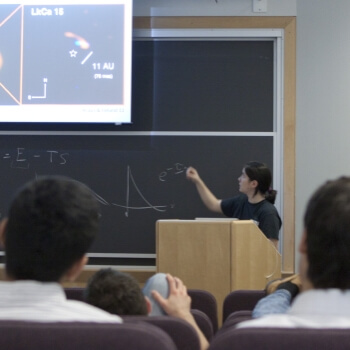News
Thirteen new classes will be offered by the John A. Paulson School of Engineering and Applied Sciences this year.
The 13 new courses offered by the Harvard John A. Paulson School of Engineering and Applied Sciences (SEAS) this year cover a wide range of topics, but they have one thing in common: an emphasis on finding innovative solutions to real-world problems. Read on for capsules on five of the new offerings.
Mitigating Toxicity through Better Materials Design (ES298r)
Instructors: Elsie M. Sunderland, Thomas D. Cabot Associate Professor of Environmental Science and Engineering, Sadasivan Shankar, Margaret and Will Hearst Visiting Lecturer in Computational Science and Engineering
Could the materials used to produce your new smart phone screen be bad for your health? If they are, you probably won’t find out until someone has already fallen ill. The global market for materials is enormous, with 60 billion tons produced worldwide each year. But toxicity of new materials can only be determined through testing or when living organisms are adversely affected. Since new materials are manufactured at a break-neck pace to keep up with increasing global demand for products like smart phones, processed food, pharmaceuticals, and automobiles, regulations and monitoring alone aren’t enough to evaluate the potential toxicity of many new materials before they hit the market.
This class asks the question: can we design a new material with targeted properties, which includes non-toxicity? Sunderland and Shankar hope that the class will lead to a new paradigm where mitigating toxicity is as important as the functionality people require in their new devices, and that toxicity can be addressed at the developmental phase long before it becomes a problem. This class will examine the electronics, energy, and packaging industries through lectures and discussions, with additional input from external experts in industry, academia, and regulatory agencies.
Extreme Computing: Project-based High Performance Distributed and Parallel Systems (AC290r)
Instructors: Pavlos Protopapas, scientific program director for the Institute for Applied Computational Science, Efthimios Kaxiras, John Hasbrouck Van Vleck Professor of Pure and Applied Physics, and Sadasivan Shankar, Margaret and Will Hearst Visiting Lecturer in Computational Science and Engineering
When a problem is enormous — in scale, scope, and complexity — an even more powerful type of computing is needed to find an effective solution. Extreme computing involves the principles, systems, and algorithms that are required to develop predictive simulations at one of the largest scales imaginable. Extreme computing could be used to determine the likelihood that a person will contract cancer, design batteries with improved storage, or identify the social media users who are the most influential. Students will learn theory and techniques and then simulate problems using different computing platforms, including MIRA, one of the most powerful supercomputers in the world. Researchers from the National Cancer Institute and Argonne National Laboratories, will offer guest lectures and conduct computer labs.
Space Science and Engineering: Theory and Applications (ES 160)
Instructor: Robin Wordsworth, Assistant Professor of Environmental Science and Engineering
This summer, the world watched captivated as the New Horizons space probe flew past Pluto, sending home brilliant images of the planet’s surface. Robotic orbital and lander missions to Venus, Mars, Mercury, Titan and other bodies have revolutionized our understanding of our solar system and remote sensing by spacecraft plays a key role in understanding and evaluating the impact of human activity on our own planet.
This course will analyze the scientific motivation for robotic space missions and the key engineering challenges faced by mission planners. It will explore the key issues involved in both Earth observation and planetary mission design, the scientific problems that can be addressed by unmanned spacecraft, and the complementary roles of remote sensing and in situ observations.
Inverse Problems (AM216)
Instrcutor: L. Mahadevan, Lola England de Valpine Professor of Applied Mathematics, of Organismic and Evolutionary Biology, and of Physics
The scientific method is often portrayed as a straightforward flow chart — you ask a question, do an experiment and then draw a conclusion. But most problems in science and engineering are inverse problems — you do the experiment, get data and then ask the question, what theory or model explains that the results. This course will explore and characterize common features of inverse problems in science and engineering, from oil prospecting and seismology to cognitive science, particle physics and engineering design. It will then introduce deterministic and probabilistic methods for the solution of those problems. Finally, it will construct algorithms and deploy them computationally on real questions drawn from the sciences and engineering.
Intelligent Systems: Design and Ethical Challenges (CS 108)
Instructor: Barbara J. Grosz, Higgins Professor of Natural Sciences
For centuries, people have imagined smart machines in fictional stories. Computer systems now communicate in speech and text, learn, negotiate, and work in teams (with people and other systems). These intelligent-systems capabilities raise questions about the impact of such systems on people and societies. Given the recent rapid pace of technical advances in AI and incorporation of AI into a variety of computer systems, it is increasingly important to educate students about AI capabilities, providing an understanding of how AI technologies work and enabling students to distinguish fact from fiction. It is likewise important for students to consider the ethical dimensions of AI systems’ capabilities, considering the potential negative impacts and acquiring an ability to discern when these should be dealt with through design and when through development of societal policies.
In addition to scholarly sources, course materials include an essay about the Golem of Prague, Isaac Asimov’s short story “Runaround” and the film “Blade Runner.”
Cutting-edge science delivered direct to your inbox.
Join the Harvard SEAS mailing list.
Press Contact
Leah Burrows | 617-496-1351 | lburrows@seas.harvard.edu
